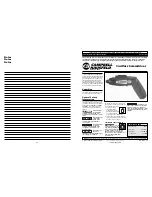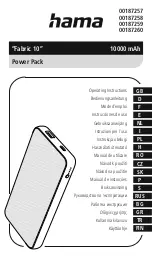
HPF24S Series Power Supplies —
P/N 52751:D3 5/11/2010
11
Jumpers
System Overview
1.4 Jumpers
1.4.1 Jumper JP1 - Ground Fault Detection
The Ground Detection circuit monitors for zero impedance between the power supply and ground.
Jumper JP1 is located in the top right section of the power supply circuit board. Cutting JP1 will
disable ground fault detection by the power supply. This should only be done if ground faults are
being monitored by a panel connected to the HPF24S power supply.
1.4.2 Jumpers JP2 and JP3: Coded/Noncoded Input Selection
Jumpers JP2 and JP3 are located in the top right section of the power
supply circuit board. JP2 is used for Control Input Circuit #1 and
JP3 is used for Control Input Circuit #2. The position of these
jumpers will depend on the type of signal being fed to the input
circuits:
•
If the source voltage to the input circuit is a noncoded (steady
voltage) input signal, the jumper for the corresponding input
circuit should be in the default position which jumpers the
bottom two pins (as illustrated in drawing at left).
•
If the source voltage to the input circuit is coded (variable
voltage), the jumper for the corresponding input circuit should
be moved to jumper the top two pins.
1.5 LED Indicators
•
AC Power on (green) LED - indicates AC power is present
•
Ground Fault (yellow) LED - indicates a ground fault condition (zero impedance to ground)
•
Battery Trouble (yellow) LED - indicates low or no battery
•
NAC Trouble (yellow) LED - indicates a Notification Appliance Circuit trouble (blinks once
for Circuit 1 trouble, twice for Circuit 2 trouble, three times for Circuit 3 trouble and four times
for Circuit 4 trouble. Note that multiple circuits in trouble will cause the LED to blink the
number of the circuit with the highest number)
•
ChargerTrouble/AC Loss (yellow) LED - indicates a charger fault or loss of AC power
– If AC is applied to the power supply without a battery connected, both the Charger
Trouble/AC Loss LED and Battery Trouble LED will turn on simultaneously, indicating that
a battery is not connected.
– When a battery is connected and the power supply is in Normal Mode, if the battery voltage
drops too low or the battery is disconnected, only the Battery Trouble LED will turn on.
– When a battery is connected and the charger develops a problem, only the Charger
Trouble/AC Loss LED will turn on.
1.6 Specifications
Refer to Figure 1.1 on page 13 for terminal locations.
Primary AC Power - TB1
•
HPF24S6 & HPF24S8: 120 VAC, 60 Hz, 3.2 amps maximum
•
HPF24S6E & HPF24S8E: 240 VAC, 50 Hz, 1.6 amps maximum
!
CAUTION:
DISCONNECT POWER
REMOVE ALL POWER (AC & DC) BEFORE CUTTING OR MOVING ANY JUMPERS.
Jumper positions shown
for noncoded (steady)
source voltage
JP3
JP2
jumpers
24s8
jp3
b.w
m
f












































